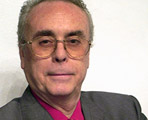José Blas Vega has died without seeing one of his most ambitious projects published: the definitive study of singer Manolo Caracol. His illness truncated the career of this tireless flamenco investigator
Text: Pablo San Nicasio Ramos
A career of nearly a half-century in which no stone of this art was left unturned. From the biographies of some of the most important stars, to the Diccionario Enciclopedia Ilustrado del Flamenco, a magna work which for decades has been a classic in every flamenco library.
A Madrid man of seventy prolific years…the work of José Blas Vega must be contemplated from the standpoint of the revolution the scientific precision he applied to the study of flamenco from the very beginning, something sadly lacking in those times. Putting aside family ties, racism and local chauvinism, his obsession for objectivity in everything he published can be seen in the more than twenty works he left, more than half of them absolutely necessary for understanding today’s flamenco.
Blas Vega spent years in charge of the folkloric recordings of the Hispavox label, overseeing the production of more than three hundred records, a feat that earned him Spain’s National Culture Prize in 1984.
I was lucky enough to interview him in three long sessions, and this turned out to be his last interview. On each occasion it was clear he felt close to those of us involved in flamenco journalism. He always pointed out the way many flamenco artists are unfair to flamencologists, in light of the fact that these are the very people who extol their qualities and help build their careers.
In love with his hometown of Madrid, flamenco was not his only interest. In fact, his last piece of work was about the history of the Gran Vía (“La Gran Vía se Divierte”), a study he published himself and which was commissioned to commemorate the centennial of the legendary Madrid avenue. Among the many topics he wrote about, José Blas Vega was also a pioneer in the history of erotic literature in Spain.
You could discuss all these things and many more in his little corner of Madrid, the Librería del Prado. A charming establishment chock full of valuable old books. One of the last antique book shops in Madrid, situated just a few meters from some of the most famous flamenco places.
He was an inquisitive person and a very active writer who was fortunate enough to rub shoulders with the most important flamenco stars of the twentieth century. Every conversation with don José was always an unforgettable experience.
Rest in peace don José Blas Vega. Writer, book-lover and warm generous human being. His work served to document an artform that today is a World Cultural Heritage, and for this we must be sincerely and eternally grateful.
Interview with José Blas Vega
